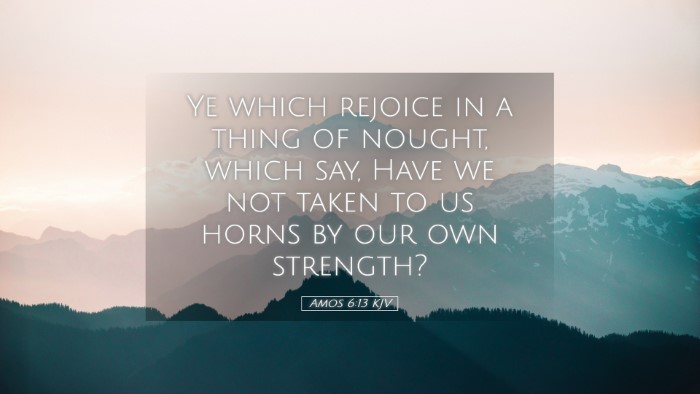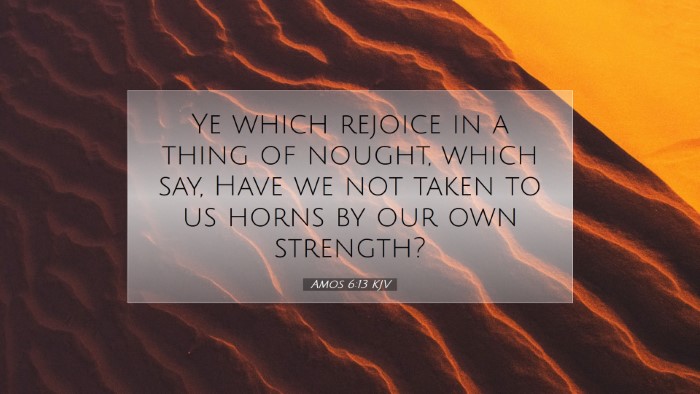Old Testament
Genesis Exodus Leviticus Numbers Deuteronomy Joshua Judges Ruth 1 Samuel 2 Samuel 1 Kings 2 Kings 1 Chronicles 2 Chronicles Ezra Nehemiah Esther Job Psalms Proverbs Ecclesiastes Song of Solomon Isaiah Jeremiah Lamentations Ezekiel Daniel Hosea Joel Amos Obadiah Jonah Micah Nahum Habakkuk Zephaniah Haggai Zechariah MalachiAmos 6:13
Amos 6:13 KJV
Ye which rejoice in a thing of nought, which say, Have we not taken to us horns by our own strength?
Amos 6:13 Bible Commentary
Commentary on Amos 6:13
Verse Text: “Ye which rejoice in a thing of nought, which say, Have we not taken to us horns by our own strength?” (Amos 6:13, KJV)
Introduction
The verse from Amos 6:13 serves as a poignant critique of the self-confidence and false sense of security among the people of Israel. This commentary will synthesize insights from prominent public domain commentators such as Matthew Henry, Albert Barnes, and Adam Clarke, providing a rich exploration of the themes presented in this passage.
Contextual Background
Amos, a prophet from the Southern Kingdom of Judah, delivered God's messages to the Northern Kingdom of Israel during a time of peace and prosperity, which had led to widespread complacency and moral decay. The people had grown prosperous through unethical means, indulging in materialism while ignoring the needs of the poor and the call of God towards justice.
Exegesis of Amos 6:13
This verse highlights two main ideas: the rejoicing in trivialities and the assertion of self-reliance. Let us break these down:
- Rejoicing in trivialities:
Matthew Henry notes that the people took delight in their empty achievements, celebrating their own devices without recognizing their futility. This 'thing of nought' represents the emptiness of pursuits that lack divine endorsement or purpose.
- Self-Reliance:
Albert Barnes emphasizes the arrogance embedded in the phrase “have we not taken to us horns by our own strength?” He interprets 'horns' as symbols of power and strength, indicating that the Israelites believed they had achieved their success through their prowess rather than through God's providence.
Theological Reflections
Both the rejoicing in empty things and the deep-seated pride in personal strength reflect a theological blindness—a failure to acknowledge God’s active role in their lives.
- The Danger of Complacency:
Clarke highlights that the celebration of unworthy achievements can lead to spiritual blindness, where sin and immorality are overlooked in the face of success.
- Idolatry of Self:
This self-reliance can become a form of idolatry. The people of Israel, in their pride, had replaced faith in God with belief in their own capabilities, reminiscent of modern-day pursuits that place autonomy above divine sovereignty.
Applications for Today
In reflecting on Amos 6:13, there are several applications for contemporary believers—especially for pastors and theologians:
- Evaluating Our Success:
We must assess whether our achievements stem from reliance on God or from self-driven endeavors. Are we celebrating accomplishments that ultimately hold no eternal significance?
- Warning Against Pride:
The warning of Amos resonates in today’s context, where self-sufficiency often substitutes for dependence on God. A posture of humility is essential for faithfulness.
- Embracing God’s Sovereignty:
The acknowledgment of God’s role in our lives is crucial. We must avoid the pitfalls of pursuing worldly gains at the cost of spiritual health and integrity.
Conclusion
Amos 6:13 serves as a stark reminder for all believers to remain vigilant against the allure of self-reliance and the trap of celebrating fruitless accomplishments. By applying the lessons drawn from the exposition of this passage, Christians can cultivate a deeper reliance on God, recognizing that true strength and success come from Him alone.


